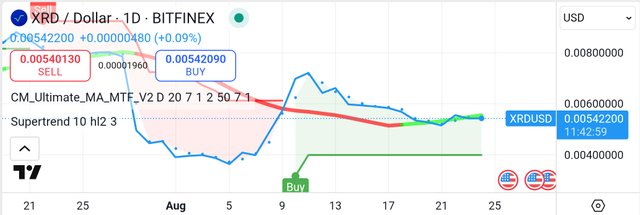1 XRD = $0.0054 USD - How it's achieving linear scalability?
Radix (XRD) is a Layer 1 distributed ledger designed to overcome the limitations of traditional blockchains, particularly in decentralized finance (DeFi). The platform is engineered to address scalability, security, and developer experience issues. Technical analysis of XRD's price action shows a positive trend, with the Ultimate Moving Average indicator confirming the upward momentum.
Radix's unique Cerberus consensus mechanism is a sharded Byzantine Fault Tolerance (BFT) algorithm. This design enables the network to scale horizontally, achieving linear scalability by processing transactions across different shards in parallel. Furthermore, the SuperTrend indicator has recently shown a buy signal, suggesting a positive outlook.
The network's execution environment, the Radix Engine, takes an asset-oriented approach, treating digital assets as native components. To complement this architecture, Radix developed Scrypto, a programming language based on Rust. Scrypto simplifies the creation of secure and robust financial applications by providing a more intuitive and safer environment for defining and managing assets.
About Radix (XRD)
Radix (XRD) is a Layer 1 distributed ledger technology (DLT) purpose-built to address the scalability, security, and developer experience challenges that have hindered the mass adoption of decentralized finance (DeFi). Unlike most traditional blockchains, Radix is not a blockchain in the conventional sense but a DLT designed from the ground up to support high-throughput, composable DeFi applications. Its unique architecture is centered on three core pillars: Cerberus consensus, the Radix Engine, and the Scrypto programming language.
Cerberus Consensus: Radix's consensus mechanism, Cerberus, is a sharded Byzantine Fault Tolerance (BFT) algorithm that enables linear scalability. Rather than processing transactions globally in a single chain, Cerberus partitions the network state into an infinite number of "shards." It uses a unique "braiding" technique to synchronize related transactions across shards without compromising atomic composability. This parallelized processing allows the network to scale horizontally as more nodes join, theoretically achieving unlimited throughput without sacrificing the ability for different dApps to seamlessly interact with each other, a critical requirement for complex DeFi applications.
Radix Engine: The Radix Engine is the execution environment for smart contracts on the network. It's designed to simplify the development of secure and robust financial applications. The engine's core innovation is its asset-oriented approach. Instead of abstractly representing assets (like tokens or NFTs) with complex smart contract code, the Radix Engine treats them as native first-class components. This inherent understanding of assets at the protocol level significantly reduces the risk of common smart contract vulnerabilities like re-entrancy attacks and provides a more predictable and secure foundation for building.
Scrypto Programming Language: To facilitate the asset-oriented paradigm, Radix introduced Scrypto, a programming language based on Rust. Scrypto's syntax and built-in features are specifically tailored for creating financial primitives. It allows developers to define and manage assets, access control, and permissions with significantly less code and effort than traditional languages like Solidity. This "DeFi Lego" approach, combined with a developer royalty system, is designed to reduce the time-to-market for dApps and foster a safer, more efficient development ecosystem. The XRD token is the network's native asset, used for transaction fees and network security via delegated proof-of-stake.
Disclaimer: This information is for education only, not financial advice—always research and consult a professional before investing.
Assisted by https://gemini.google.com/.
See also:
- Reversteem: merges the strategic thrills of classic Reversi with the decentralized power of Steem blockchain, letting you duel friends through blockchain-recorded games
- @steem.amal: Charity At Your Fingertips
- Maximize curation rewards: follow our trail! Maksimalkan reward kurasi: ikuti trail kami! トレイルをフォローし、キユレーション報酬を最大化!
- Pi Network - Crypto Pertama Yang Dapat Ditambang Di Ponsel
- Piネットワーク — スマートフォンでマイニングできる最初の暗号通貨

Upvoted! Thank you for supporting witness @jswit.